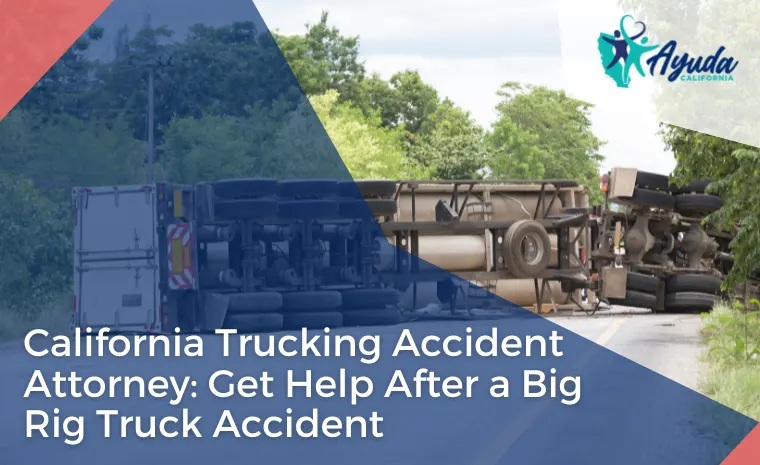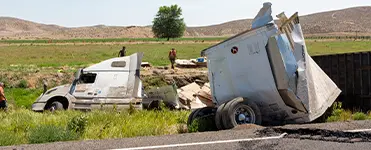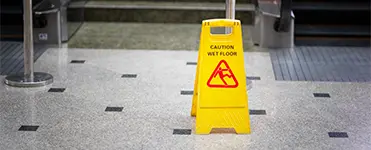Picture this, you’re cruising down the highway, music blasting, feeling the wind in your hair. Suddenly, you hear a loud honk, and before you know it, a massive big rig truck slams into the side of your vehicle! Your heart is racing, and you can feel the adrenaline pumping through your veins. What do you do now?
If you have been involved in a truck accident, there are several important steps you should take to protect your safety, your legal rights, and your ability to seek compensation for any injuries or damages you have suffered. Here are some key steps to follow after a truck accident:
1. Seek medical attention.
Your health and safety should be your top priority after a truck accident. Even if you feel fine, it’s important to seek medical attention as soon as possible, as some injuries may not be immediately apparent. If you or anyone involved in the accident is seriously injured, call 911 right away.

2. Contact the police.
It’s important to report the accident to the police, even if it seems relatively minor. The police will create an official report of the accident, which can be useful if you need to file an insurance claim or a personal injury lawsuit.
3. Exchange information.
Exchange contact and insurance information with the other driver involved in the accident. This should include their name, phone number, insurance company and policy number, and the make and model of their vehicle.
4. Gather evidence.
If possible, take photos of the accident scene and any damage to your vehicle or other property. This can be important evidence if you need to file an insurance claim or a personal injury lawsuit. Also, write down the contact information of any witnesses who may have seen the accident.
5. Consult with a California trucking accident attorney.
If you have been injured in the accident, it’s important to consult an experienced California big rig truck accident lawyer right away. A California trucking accident attorney can also help you navigate the insurance claims process and may be able to help you pursue compensation for your injuries and other losses.
6. Notify your insurance company.
After you’re gotten in touch with a lawyer, reach out to your insurance company as soon as possible. Your insurance company can help you file a claim and may be able to provide you with a rental car or other assistance while your vehicle is being repaired.
In an accident vs a truck?
Compensation for Truck Accident Victims
Note that you are entitled to compensation for your medical expenses, lost wages, pain and suffering, and other damages. Here are some of the types of compensation that may be available in a truck accident case:
Medical Expenses
You may be entitled to compensation for your medical expenses, including hospital bills, doctor’s visits, physical therapy, and other medical treatments. This may include past and future medical expenses, depending on the extent of your bodily injuries and the expected duration of your recovery.
Lost Wages
If your injuries prevent you from working, you may be entitled to compensation for your lost wages. This may include past and future lost wages, depending on the extent of your injuries and the expected duration of your recovery.
Property Damage
If your vehicle or other property was damaged in the accident, you might be entitled to compensation for the cost of repairing or replacing the damaged property. This may include both the cost of repairing the vehicle and the value of any personal property that was damaged in the accident.
Pain and Suffering
You may also be entitled to compensation for your pain and suffering, which can include physical pain, emotional distress, and other non-economic damages. This type of compensation is often calculated based on the severity of your injuries and the impact they have had on your quality of life.
Punitive Damages
In some cases, you may also be entitled to punitive damages, which are designed to punish the defendant for particularly reckless or negligent behavior.
Big Rig Truck Accidents in California
WUSA9’s series of investigative reports on “underride accidents” — crashes where vehicles get lodged underneath a truck’s trailer — started in 2017. Now, the largest verdict ever recorded against a trucking company for one such accident is revealing how the trucking industry fought against installing new safety features for more than a decade, despite being aware of the risks.
In 2015, a side underride crash caused severe injuries to 16-year-old Riley Hein, who was driving on a rural road in New Mexico. The truck, manufactured by Utility Manufacturing Company, lacked a side underride guard that could have prevented Hein’s car from getting trapped under the trailer. The truck driver unknowingly dragged Hein’s car for half a mile until it caught fire, killing Hein.
In August, a New Mexico jury found the trucking company Barkandhi Express and Utility negligent for not having a side underride guard that could have saved Riley’s life and awarded her family a $42 million verdict.
Side guards are designed to stop cars from sliding beneath the side of a trailer in case of an accident. WUSA9 first interviewed Eric Hein during a crash test held in March outside Audi Field in Southwest D.C. to demonstrate how side guards work.
Key Trucking Laws in California
Truck accidents are a serious problem on California roads, and the state has established a range of laws and regulations to help prevent these accidents and protect victims when they occur. Here are some of the key laws and regulations that govern truck accidents in California:
Commercial Driver’s License (CDL) Requirements
To operate a commercial vehicle, truck drivers in California must have a valid commercial driver’s license (CDL). The CDL requires special training and testing to ensure that drivers are qualified to operate large vehicles safely. In addition, California requires that drivers undergo a medical examination to ensure that they are physically capable of operating a commercial vehicle.
Hours of Service (HOS) Rules
The Federal Motor Carrier Safety Administration (FMCSA) has established hours of service rules that limit the number of hours a truck driver can work in a day and in a week. These rules are designed to prevent driver fatigue, which is a common cause of truck accidents.
In general, truck drivers are limited to 11 hours of driving time in a 14-hour workday, and they must take a 30-minute break after eight hours of driving.
Maintenance and Inspection Requirements
Trucking companies in California are required to perform regular maintenance and inspections on their vehicles to ensure that they are safe for the road. This includes regular inspections of brakes, tires, lights, and other critical systems. Failure to maintain a truck properly can result in serious accidents, and trucking companies can be held liable for accidents that are caused by a failure to properly maintain a vehicle.
Liability
In California, trucking companies and their drivers can be held liable for accidents that they cause. If you are involved in a truck accident, you may be able to file a personal injury claim to seek compensation for your injuries and other losses. However, it’s important to note that liability can be a complex issue in truck accident cases, as there may be multiple parties involved, including the driver, the trucking company, and the truck’s manufacturer.
Statute of Limitations
It’s important to note that there is a statute of limitations on personal injury claims in California. You generally have two years from the date of the accident to file a claim. It’s important to consult with an experienced California Trucking Accident Attorney to ensure that you don’t miss any important deadlines. Additionally, if the truck involved in the accident is owned by a government agency, there may be different filing requirements and deadlines to follow.
Electronic Logging Devices (ELDs)
To improve compliance with HOS rules, the FMCSA has mandated the use of electronic logging devices (ELDs) for most commercial vehicles. These devices automatically record driving time and can help ensure that drivers are not exceeding the maximum hours of service.
In addition to these laws and regulations, California also has strict rules governing truck size and weight limits, as well as restrictions on truck routes in certain areas. If you have been involved in a truck accident in California, it’s important to consult with a California big rig truck accident lawyer who specializes in personal injury law to help you understand your rights and options.
To assist you, Call Ayuda California! We have legal experts and lawyers who will help you win your cases. Remember: you don’t have to worry about the expenses. No fees, unless we win!




















